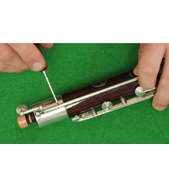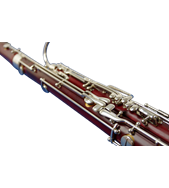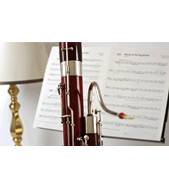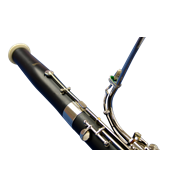How can I get the best out of my bassoon playing?
February 3rd, 2023

How can I get the best out of my bassoon playing?
This article looks, first, at the bassoon as a physical music-making tool, and how its various characteristics affect the sounds you make; and second, it looks at how you can use this information to help you on your bassoon journey.
What makes bassoons sound different to one another?
- The Bore
A bassoon is basically a means of containing and manipulating a column of air in order to produce sound. The column of air in a bassoon is conical – ranging from a couple of millimetres at the crook to several centimetres at the bell. The length of the column of air, its width and the degree to which it is conical all affect the characteristics of the tone produced. Fox, for example, have ‘short bore’ and ‘long bore’ bassoons which they have designed specifically to alter the tone and performance characteristics of their respective bassoons. Other makers do similar things, but may not describe them in the same way.
Other factors influencing the tone and performance character are the evenness of the cone, the treatment of the inner surface of the bore (smoothness, whether made of wood or lined, or how the wood has been treated for example), and the interaction between the wood enclosing the column of air with the column itself. This interaction is affected by the nature of the wood, how it has been treated and its thickness among other factors.
- The Tone Holes
Moving on from the bore itself, the column of air is affected by which tone holes are open, as this determines the pitch of the note played. The placement, width, angle (and smoothness, etc.) of each tone hole has an impact on the tone of the bassoon when that hole is open, as well as the pitch of the note played. Of course, if some tone holes leak slightly when they are meant to be closed this will also have an impact on the tone of the bassoon - softening and quietening the tone and even stopping the note from speaking at all.
Any model of a particular bassoon will sound broadly the same as every other example of that model owing to its general dimensions and tone hole placement, etc., but they all do differ. The tolerances required to make a bassoon are very exacting and no bassoon is exactly spot on in every one of the hundreds of dimensions necessary for it to achieve the platonic ideal of that model of bassoon.
- Condition
The challenge we, in our workshop, face in servicing or overhauling a bassoon is to strive to bring it back to the way it was when it left the maker – with no deterioration owing to time or moisture (or mishandling). It is perfectly possible to do this, and in some cases it is even possible to improve on how it was when it left the factory. But it is time-consuming, skilled work – very satisfying to bring a bassoon back to life, but painstaking to do.
Is there such a thing as a perfect bassoon?
As already mentioned, making a bassoon is very exacting, so the short answer is no: no bassoon has ever, or will ever, achieve the platonic ideal of perfection. Leaving aside variations in manufacturing accuracy, there are more fundamental considerations.
For example, owing to the inevitable compromises required to make a bassoon ergonomically playable it isn’t possible to place all the tone holes in exactly the right spot. Therefore no bassoon has every note playing in perfect pitch with perfect clarity, or with perfect evenness through all dynamics. Some admittedly get closer to the ‘ideal bassoon’ than others, but none have ever reached it.
Further than that, one has to ask: “perfect for whom, and in what performance context?”. Different playing styles and performance demands mean that no bassoon will suit all bassoonists or can ever be expected to do so; or, at least, not all bassoonists in all circumstances*.
Selecting a bassoon for yourself, therefore, can often come down to the compromises you decide you can live with in order to achieve the characteristics on which you place a premium, taking into account your playing style and your performance context.
You, the reed and the crook
Moving on then from the bassoon itself (i.e. the four joints), the tone and other characteristics of a bassoon are strongly affected by the crook and the reed. The slightest variation in the crook, and more particularly the reed, has an out-sized effect on the performance of a bassoon. This is because the slightest variations at the narrowest part of the cone are amplified through the bassoon. Added to this, the embouchure and playing style of every bassoonist is unique, also affecting performance.
Each one of the four components contributing to the sound a bassoonist makes (the bassoonist, the reed, the crook and the bassoon itself) can work together or against each other, sometimes producing surprising results. Eliminating the effect of a particular reed or crook, therefore, by trying different combinations is the only way to really know whether a bassoon will perform well for a particular bassoonist.
How can I use this information to help me on my bassoon journey?
You may well be asking how all this may impact upon me practically?
Hopefully it will help you attend more carefully to the characteristics of your bassoon combination (ie. bassoon plus reed plus crook plus you) and how it compares with others.
Here are a few questions to consider, to help you focus your thoughts:
- Is the pitch of all notes good enough for your needs?
- Does your bassoon ‘cut through’ and/or ‘project’ well enough for your playing context?
- Or contrarily, does it blend to the extent desired with the other members of the woodwind section or the orchestra generally?
- Does it play as evenly as you need through the scale?
- Does it play as evenly and consistently as you need at different dynamics?
- Is the keywork comfortable and easy to use for extended playing and/or fast passages?
- Is the bassoon generally comfortable to hold and support?
- And more subjectively, but perhaps as important for many as all the others put together (apart from professionals with very demanding performance requirements perhaps) – do you like the tone you produce on it in the different registers? The beautiful tone of the bassoon is often what started many on their bassoon journey, so you should never lose sight of that subjective response to the sound you make.
If you are dissatisfied with your bassoon in any of the areas mentioned here, why not talk to us about reeds, crooks, the impact that servicing by a specialist could have on your bassoon, or even up-grading your bassoon to something more suitable?






